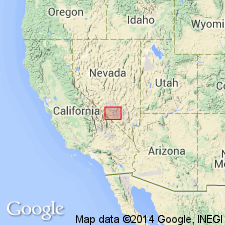
- Usage in publication:
-
- Crater Flat Tuff*
- Modifications:
-
- Named
- Dominant lithology:
-
- Tuff
- AAPG geologic province:
-
- Great Basin province
Summary:
Tuff formerly mapped as tuff of Crater Flat named Crater Flat Tuff for exposures around edges of Crater Flat (the type locality), Nye Co, NV in the Great Basin province. Consists of Bullfrog Member, new at base, an ash-flow sheet, Prow Pass Member, new at top, a devitrified welded tuff, and some unnamed intercalated breccia, bedded tuff, and ash-flow tuff. Is 190 m thick at type Crater Flat; the Bulldog is 130 m thick, the intercalated breccia is 10 m thick, and the Prow Pass is 50 m thick at that locality. This is the only section in which both members are glassy, unaltered and amenable to K-Ar dating. A 14.0 and 13.0 m.y. ages obtained from a vitrophyre in the lower part of the Bullfrog; 14 m.y. thought to be the most reliable date. Both members have normal remanent magnetism. Distribution map. Modal analyses and silica range diagram. Erupted from the Sleeping Butte caldera.
Source: GNU records (USGS DDS-6; Denver GNULEX).
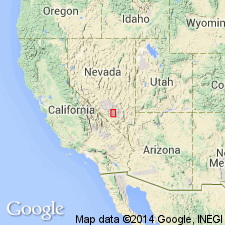
- Usage in publication:
-
- Crater Flat Tuff*
- Modifications:
-
- Areal extent
- AAPG geologic province:
-
- Great Basin province
Summary:
Distribution on both sides of Yucca Flat, Nye Co and east into Clark Co, NV in the Great Basin province, shown on map. Considered to be a widespread unit. Is one of the 7 units that replace use of Indian Trail Formation, a name abandoned in this report.
Source: GNU records (USGS DDS-6; Denver GNULEX).
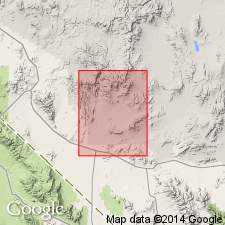
- Usage in publication:
-
- Crater Flat Tuff*
- Modifications:
-
- Overview
- AAPG geologic province:
-
- Great Basin province
Summary:
Mapped as an undivided unit and as small outcrops at southwest side of Little Skull Mountain, in Pluto Valley near east-central edge of area, and in subsurface in cross sections, Nye Co, NV in the Great Basin province. Tram and Bullfrog Members mapped east and south of Little Skull Mountain. Bullfrog and Prow Pass Members mapped near Prow Pass. Assigned to the Miocene. Is younger than the dacite lava and flow breccia and older than Salyer Formation.
Source: GNU records (USGS DDS-6; Denver GNULEX).
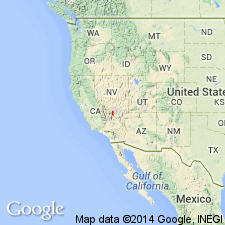
- Usage in publication:
-
- Crater Flat Tuff*
- Modifications:
-
- Revised
- AAPG geologic province:
-
- Great Basin province
Summary:
A new member, at base, not recognized in the Crater Flat area named Tram Member of Crater Flat. Tram is exposed mainly in fault blocks between north end of Crater Flat and Beatty Wash. Tram rests unconformably on Lithic Ridge Tuff (new). Tram is present (distribution and thickness map) south-central Nye Co, NV in the Great Basin province, and may extend west into Inyo Co, CA; Tram ranges between 0 and 280 ft thick. Bullfrog Member, the middle member, may extend west to Inyo Co, CA and east to Lincoln Co, NV from south-central Nye Co where it ranges from 0 to 400 ft thick (distribution and thickness map). Prow Pass has the most limited extent of the three members being present only in south-central Nye Co where it ranges between 0 and 225 ft thick (distribution and thickness map). Geologic map; stratigraphic chart. Crater Flat thought to range from 13.6 m.y. (Tram), 13.5 m.y. (Bullfrog), and 13.4 m.y. (Prow Pass).
Source: GNU records (USGS DDS-6; Denver GNULEX).
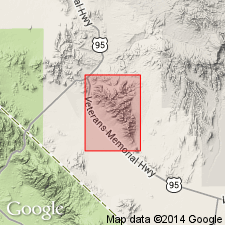
- Usage in publication:
-
- Crater Flat Tuff*
- Modifications:
-
- Age modified
- Geochronologic dating
- AAPG geologic province:
-
- Great Basin province
Summary:
Unit age in report area [Bare Mountain, Nye Co, NV] modified from Miocene to: middle Miocene [1983 DNAG Geologic Time Scale usage] based on radiometric ages of approximately 15 to 12.8 Ma.
Source: GNU records (USGS DDS-6; Menlo GNULEX).
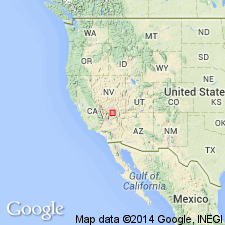
- Usage in publication:
-
- Crater Flat Group*
- Modifications:
-
- Revised
- Geochronologic dating
- AAPG geologic province:
-
- Great Basin province
Summary:
Within southwest Nevada volcanic field, Nye Co, NV, Great Basin province, units previously of formation rank are raised to group rank to allow for combining petrographically, geochemically, and temporally related lava flows and nonwelded tuffs with the principal correlative welded ash-flow tuff sheets (formerly members of the previous formation-rank tuffs). The ash-flow sheets are raised to formation rank and designated as "Tuff." Crater Flat consists of (ascending) Tram, Bullfrog, and Prow Pass Tuffs (all ranks raised). [Crater Flat also consists of informal units not discussed in this report.] Younger than Belted Range Group (rank raised and other revisions); older than Wahmonie Formation. Nomenclature shown on table 1. Ar40/Ar39 date on average of 2 sanidine samples from Bullfrog yielded an age of 13.2 +/-0.03 Ma (Miocene).
Source: GNU records (USGS DDS-6; Denver GNULEX).
For more information, please contact Nancy Stamm, Geologic Names Committee Secretary.
Asterisk (*) indicates published by U.S. Geological Survey authors.
"No current usage" (†) implies that a name has been abandoned or has fallen into disuse. Former usage and, if known, replacement name given in parentheses ( ).
Slash (/) indicates name conflicts with nomenclatural guidelines (CSN, 1933; ACSN, 1961, 1970; NACSN, 1983, 2005, 2021). May be explained within brackets ([ ]).

